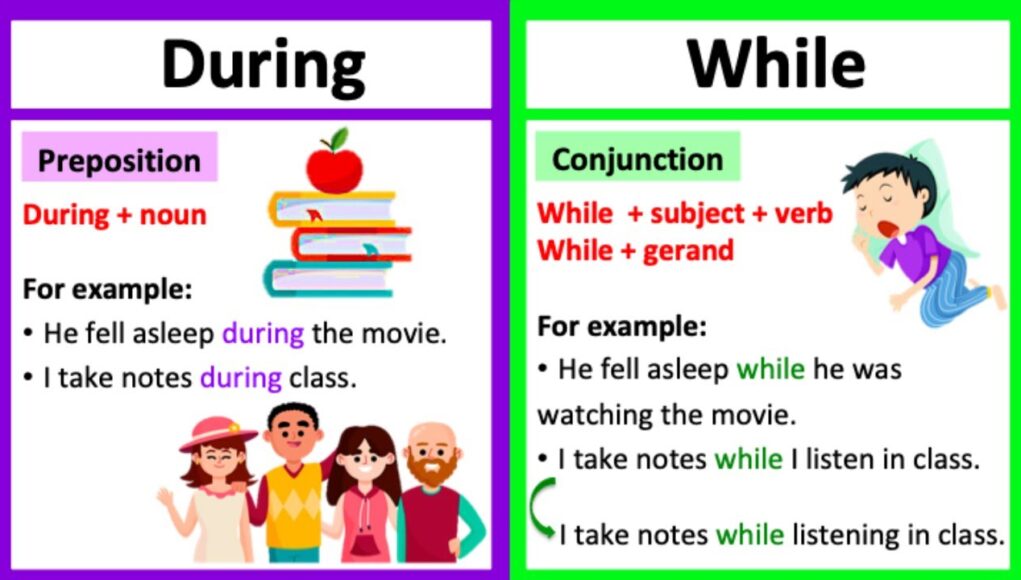Last Updated on April 22, 2024 by Umer Malik
Many a time, we get confused between using “when” and “while”, this is because these two conjunctions are used to discuss situations or actions that occur simultaneously. So, to help you understand when and how to use these two conjunctions, the experts of eduhelphub have discussed their meaning and usage along with several examples in the most elaborate manner in this guide.
When – Meaning and Usage
When means – at the time that. It is used to connect two actions or events that occurred simultaneously or events that occurred immediately after one another. It is also possible to introduce a single event that was completed in the middle of a longer activity or event.
- When I go on vacation, I like to wear casual clothes (depicts at the same time)
- She came out when I rang the doorbell (depicts immediately after)
- When he heard the news, he was on his way home from school (introduces a single completed event that occurred in the middle of a longer activity or event)
‘When’ can be specially used to talk about ages and periods of life. We can talk about the past, present, and future using this conjunction.
- Call me when the demonstration begins.
- When I was little, I wanted to become a police officer.
- I will disclose everything to him when he returns.
- When you have finished your homework, you can go out.
However, it should be noted that we use the simple present or present perfect, not future tenses when discussing the future. The last two examples demonstrate this. You will find more such examples at https://penmypaper.com/write-my-essay.
While – Meaning and Usage
The conjunction “while” can be used to indicate actions and events that occur simultaneously in the present, the past, and the future. When referring to two long actions or events that occur simultaneously, while can be used specifically in place of when.
- While his mother was grocery shopping, the young boy waited in the car.
- While their children were playing volleyball, the ladies were lying on the beach basking in the sun.
- I like to listen to music while cooking.
Also, this conjunction can be used to show a contrast. Take the remark, “He wanted to go to Australia while his wife wanted to go to Paris”, as an illustration. The conjunction ‘while’ links two sentences that contrast one another in this context.
Difference Between When and While
Usage
‘When’ can be used as a conjunction, relative adverb, or an interrogative adjective.
‘While’ can be used as a conjunction and a noun.
Period of Life
‘When’ is used to define ages and times in a person’s life.
‘While’ cannot be used to define ages or periods.
Actions
‘When’ used as a conjunction, may refer to actions that occur simultaneously or immediately after one another.
‘While’ can be used as a conjunction to refer to simultaneous events or actions.
Contrast
‘When’ does not represent a contrast.
‘While’ can be used to show a contrast.
Still Confused? Look at the following examples
While I was making dinner, the bell rang.
In the above instance, the first action is in the past continuous tense. It depicts that the action “making dinner” took place over some time. While the main clause “the bell rang” is in the simple past tense, it is a single action that is taking place at a point in time.
In a sentence, the order of events with subordinating conjunctions can pose confusion between choosing when or while. Let us change the order of the above example.
This is what we get:
When the bell rang, I was making dinner.
Here, we can see the conjunction “when” lies in the clause with the single action, “the bell rang”.
Let us look at another example:
When I’m at work, do not disturb me.
While I’m working, do not disturb me.
Both sentences depict the same meaning but the use of when and while is different.
So, as a basic rule, you must use ‘when’ in a clause having a single action and using a simple present or past tense. Use ‘while’ in a clause with a continuous event or action, using a verb in the continuous tense. Hopefully, this guide was helpful to you and will surely clear all your doubts regarding the uses of when and while. For more such helpful guides, you can check out essaywriterhelp.org.


















